Abstract
Introduction:
During the war in Bosnia and Herzegovina, which lasted from 1992-1995, the functioning of all sectors was disturbed, including the health sector. The priority of the heath sector was treatment and less attention was paid to prevention, and this applies also to the Program of implementation of obligatory immunization, as one of the most important prevention measures. This program was conducted with difficulty and sometimes was completely interrupted because of the lack of necessary vaccines and the inability of adequate maintenance of the cold chain. It was difficult and sometimes completely impossible to bring children to vaccination. Because of these problems, a great number of children stayed unvaccinated so they suffered from vaccine-preventable diseases several years after the war.
Materials and methods:
This is a retrospective epidemiological study. We analyzed data from January 1994 to July 2014 in Canton Sarajevo, and data about measles outbreak in 2014.
Results:
In the period from January 1994 to July 2014, 3897 vaccine-preventable diseases were registered in Canton Sarajevo. Among them measles, rubella and mumps were the most frequent. In March 2014, measles outbreak was registered. Almost all cases are unvaccinated (99%) and 43% of all cases are connected with failure of vaccination during the war.
Conclusion:
During the war, routine immunization program was disrupted in Bosnia and Herzegovina (also in Canton Sarajevo). The consequences are presented as vaccine preventable diseases cases.
Keywords: war, immunization, Bosnia and Herzegovina
1. INTRODUCTION
War is one of the most difficult emergencies which is characterized by disruption of basic social functions, including health care. In the health system, treatment gets priority and less attention is paid to prevention and rehabilitation. The implementation of obligatory immunization program as one of the most important achievements in medicine and one of the most important preventive programs, whose introduction saved millions of lives, is also neglected.
“Almost 11 millions of children die every year of preventable causes. Millions of people die when lifesaving vaccines and medicines exist, but do not reach those who need them because they or the countries they live in are too poor to pay for or distribute, them”.
(UN Secretary- General, Kofi Annan Statement to the 59th Commission on Human Rights, 20 March 2003, Geneva, Switzerland)
Routine immunization program in Bosnia and Herzegovina (B&H) is obligation for all children and young from birth to 18 years. Following vaccines are in use: BCG, hepatitis A, poliomyelitis, diphteria, tetanus, pertussis, haemophylus influenzae type B, measles, rubella, parotitis.
The war in B&H lasted from 1992-1995. Sarajevo is the capital city and its siege was one of the longest in the history of modern warfare and the longest siege of one capital ever. It lasted 44 months, from April 5, 1992 to February 29, 1996. During the siege, the city was almost completely cut off from the rest of the country and this resulted in shortages of food, electricity, gas, medicine and water. Citizens were often exposed to sniper fire. An average of 329 shells fired at the city daily.
The implementation of obligatory immunization program was seriously disturbed for many reasons and the most important were: difficult and sometimes disabled supply with necessary vaccines, difficulties in vaccine storage, maintenance of the “cold chain” and problems in the implementation of the immunization program related to the organization of health care service and the behavior of population.
As immunization is a preventive measure with a longterm effect, some of the consequences of ommisions in the implementation of the immunization program are vissible even now, almost 20 years after the war, and they are manifested by the appearance of suffering from vaccine–preventable diseases.
2. GOAL
In this paper we will show the trend of vaccine-preventable diseases in people who were not vaccinated during the war, with a special review on the measles outbreak.
3. MATERIAL AND METHODS
This is a retrospective epidemiological study. For this study we used protocols and reports about vaccine-preventable diseases for the period January 2008 to July 2014 Canton Sarajevo. Special attention was paid on measles, mumps and rubella, where we analysed data for the period from January 1994 to July 2014.
4. RESULTS
Immunization program during the war in Canton of Sarajevo was completely disrupted. All possible problems connected to immunization were present. The main of them were: shortages of vaccines, problems with maintenance of the cold chain, difficulty in bringing children to vaccination, a high risk to bring children to vaccination, a large number of orphaned children, a large number of wounded children. Sometime immunization was neglected by parents, but also by health professionals.
As a consequence, few years after the war some vaccine preventable diseases occured. Table 1 presents vaccine-preventable diseases in the period 2008-2014.
Table 1.
Vaccine-preventable diseases in the period 2008-2014
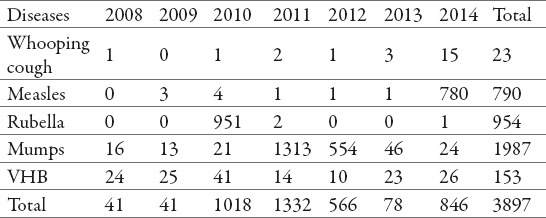
Figure 1.
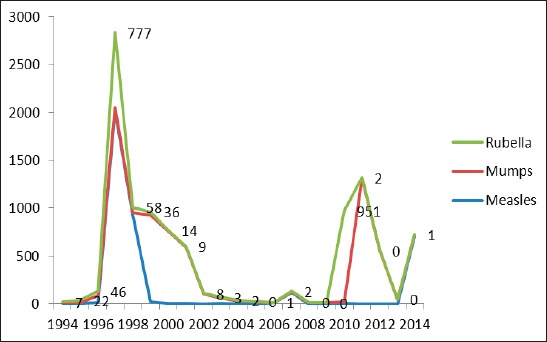
Measles, rubella and mumps (1994-2014)
Figure 2.
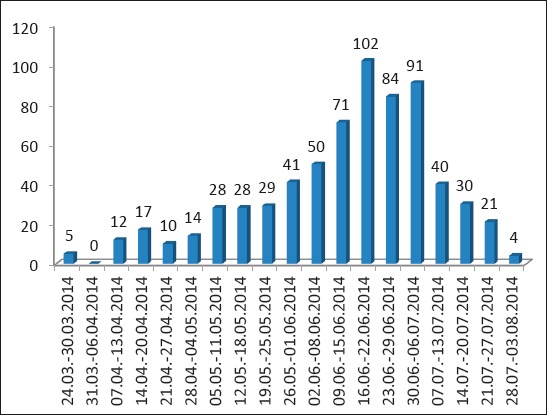
Measles cases per week
Table 2.
Possible vaccinal status according to age
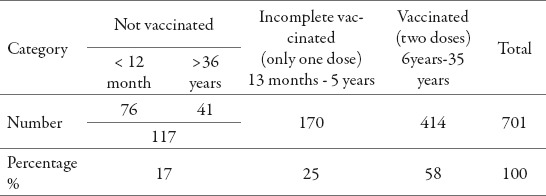
Figure 3.

Age distribution of measles cases
Figure 4.
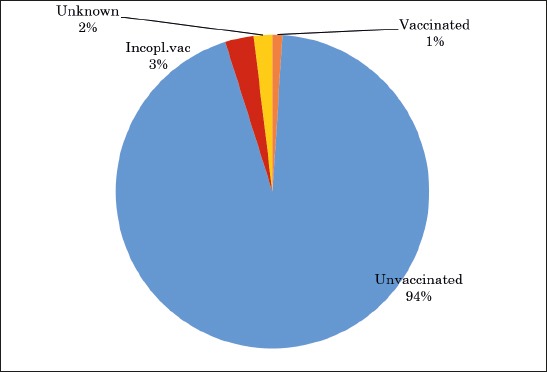
Vaccinal status of cases
Our main focus are measles, rubella and mumps, because these three diseases are prevented by one vaccine (MRP) which is given to children in the age of 13 months of life and in the age of 5 years. This vaccine was introduced in the immunization program in 1980.
The measles outbreak started in 2014 (26. March) and is still going on. We divided all the cases in three categories according to the parameter of possible impact of the war on the vaccinal status:
I category – young people in which war did not have any impact on immunization: 0-15 years
II category – people in which war could have impact on immunization: 16-35 years
III category – older people in which war did not have any impact on immunization: > 36 years
Table 3.
Categories of people according to the impact of war on immunization

It is very important to highlight that twenty years after the war 43% of measles cases are in the II category–people where war could have impact on immunization.
5. DISCUSSION
During the war in Bosnia and Herzegovina, health care services were disrupted. The same situation is almost during all wars, and Garfield described a very similar situation in Nicaragua.(1). Almost all health services were disturbed, including the implementation of the immunization program, and because of that one of the main consequence is inadequate vaccination (2).
Health effects of the war are different (Neisen 3). Sometimes, they are direct, and sometimes indirect. During the war a lot of people lost their place of living and became refugees (Miller, 4). They also lost their own habits and practices. They didn’t pay enough attention on the preventive measures for protecting own health. Children, as a specific vulnerable group are very susceptible for different diseases, so the war has a big impact on child health. Many authors investigated the impact of war on children (5,6,7). There are regional and ethnic dimensions on child immunization and malnutrition as described by Agadjanian (8)
The impact of the war on immmunization coverage is known and described by different authors (9,10,11). Very often as a consequence measles outbreaks are present. It happened in the West Bank and Gaza during the Gulf War in 1991. (12)
In some countries the immunization program has a goal to reduce mortality from specific diseases. During the war in Guinea Bissau many chlidren did not receive the measles vaccine and in this group moratlity rate ratio was much higher comparing to the group of vaccinated children. (13)
An outbreak of rubella in the Federation of Bosnia and Herzegovina from December 2009-May 2010 indicates failure to vaccinate during wartime (1992-1995) (14)
As a consequence of war measles outbreak is registered in Canton of Sarajevo. Almost all cases (99%) are unvaccinated or not completely vaccinated. 43% of cases should have been vaccinated during war, but because of the above listed problems they stayed unvaccinated. That is why we feel consequences of it twenty years after the war.
6. CONCLUSION
The impact of war on the routine immunisation program in Bosnia and Herzegovina was huge and the consequences still appear as new cases of vaccine preventable diseases.
Footnotes
CONFLICT OF INTEREST: NONE DECLARED.
REFERENCES
- 1.Garfield RM. War-related changes in health and health services in Nicaragua. Soc Sci Med. 1989;28(7):669–676. doi: 10.1016/0277-9536(89)90214-1. [DOI] [PubMed] [Google Scholar]
- 2.CDC: Vaccination sercices in postwar Iraq, May 2003. MMWR. 2003 Aug 8;52(31):734–735. 2010; Jan 11; 172(2): 132-136. [PubMed] [Google Scholar]
- 3.Neisen, et al. Health consequences of armed conflict in Guinea-Bissau. Ugesk Laeger. 2010 Jan 11;172(2):132–136. [PubMed] [Google Scholar]
- 4.Miller, et al. Afgan refugee children and mothers. Arch Pediatr. Adoles Med. 1994 Jul;148(7):704–708. doi: 10.1001/archpedi.1994.02170070042007. [DOI] [PubMed] [Google Scholar]
- 5.Cliff J, Noormahomed AR. The impact of war on children's. Soc Sci Med. 1993 Apr;36(7):843–848. doi: 10.1016/0277-9536(93)90076-g. [DOI] [PubMed] [Google Scholar]
- 6.Barath A. Children's well-being after the war in Kosovo: survey in 2000. Croat Med J. 2002 Apr;43(2):199–208. [PubMed] [Google Scholar]
- 7.Rieder M, Choonara I. Armed conflict and child health, publiched online Mar 9. 2011 doi: 10.1136/adc.2009.178186. [DOI] [PMC free article] [PubMed] [Google Scholar]
- 8.Agadjanian V, Prata N. Civil war and child health: regional and ethnic dimensions of child immunization and malnutrition in Angola. Soc Sci Med. 2003 Jun;56(12):2515–2527. doi: 10.1016/s0277-9536(02)00286-1. [DOI] [PubMed] [Google Scholar]
- 9.Cetorelli V. The impact of the Iraq War on neonatal polio immunisation coverage: a quasi – experimental study. J Epid Comm Health. 2013 Nov 23; doi: 10.1136/jech-2013-203174. [DOI] [PubMed] [Google Scholar]
- 10.Vargha D. Between East and West: polio vaccination across the Iron Curtain in Cold War Hingary. Bull.Hist.Med. 2014 Summer;88(2):319–343. doi: 10.1353/bhm.2014.0040. [DOI] [PubMed] [Google Scholar]
- 11.Mashal T, et al. Impact of conflict on infant immunisation coverage in Afganistan: a countrywide study 2000-2003. Int J Health Geogr. 2007 Jun 7;6:23. doi: 10.1186/1476-072X-6-23. [DOI] [PMC free article] [PubMed] [Google Scholar]
- 12.Tulchinsky TH, Belmaker I, et al. Measles during the Gulf War: a public health threat in Israel, the West Bank and Gaza. Public Health Rev. 1992-1993;20(3-4):285–296. [PubMed] [Google Scholar]
- 13.Aeby P, Garly ML, et al. Survival of previously measles-vaccinated and measles-unvaccinated children in an emergency situation: an unplanned study. Pediatr. Infect. Dis. J. 2003 Sep;22(9):798–805. doi: 10.1097/01.inf.0000083821.33187.b5. [DOI] [PubMed] [Google Scholar]
- 14.Hukic M, et al. An outbreak of rubella in the Federation of Bosnia and Herzegovina between December 2009 and May 2010 indicates failure to vaccinate during wartime (1992-1995) Epidem Infe. 2012 Mar;140(3):447–453. doi: 10.1017/S0950268811000707. [DOI] [PubMed] [Google Scholar]


